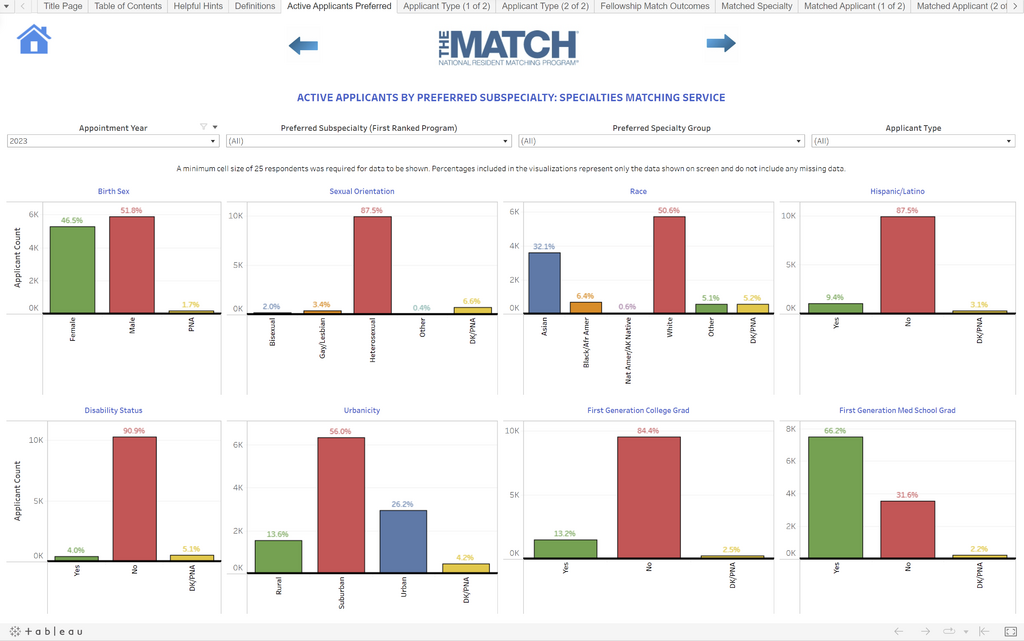NRMP® Publishes Charting Outcomes™: Demographic Characteristics of Applicants in the Specialties Matching Service®
The interactive report will dive into unique demographic characteristics of fellowship Match applicants.
The National Resident Matching Program® (NRMP®) is pleased to publish Charting Outcomes™: Demographic Characteristics of Applicants in the Specialties Matching Service® focused on data from fellowship Match applicants in 82 subspecialties for the 2023 appointment year.
The NRMP’s Charting Outcomes™ demographic data interactive reports for both fellowship Match and Main Residency Match applicants, represent the first among medical education organizations to take a comprehensive look at applicant demographic data characteristics as they relate specifically to preferred medical specialty choice and Match outcomes. The aim of the demographic data collection and analysis is to advance understanding of and encourage discussion about relationships among the unique characteristics of applicants, the specialties they pursue, and their experience in the Match.
“The NRMP is excited to offer this new demographic data report as part of our robust research agenda,” says NRMP President and CEO Donna L. Lamb, DHSc, MBA, BSN. “By making the findings available from this work to the medical education community, we believe these data will help inform efforts in understanding and increasing transparency about the matching process and improve diversity, equity, inclusion, and belonging in the transition to residency.”
Demographic characteristics about which fellowship Match applicants were asked include:
- Sex assigned at birth
- Sexual orientation
- Gender identity
- Race identities
- Hispanic/Latinx/Spanish ethnicity
- Disability status and accommodations sought during residency
- Urbanicity of childhood rearing environment
- First-generation college and medical school graduation statuses
The sample size of applicants who consented to provide demographic data for research for the 2023 appointment year was 11,409 which equals 81.2 percent of fellowship Match applicants. To ensure applicant confidentiality, only those characteristics that yielded large enough response sizes are included in the report.
Utilizing the Report. In this report, viewers can examine applicant demographics by both preferred subspecialty (the subspecialty of the program ranked first on the applicant’s rank order list) and matched subspecialty (the subspecialty an applicant matched to when the matching algorithm was processed). In addition to the ability to examine the report findings by subspecialty, viewers can also use the Applicant Type dropdown menu to view the information by each of the five applicant types available in this report.
Individual subspecialties can be selected from the Preferred and Matched Subspecialty dropdown menus. Because some subspecialties will not have enough data to populate the visualizations for a few more years of data collection, viewers have the option to select individual subspecialties or superordinate categories into which some of the smaller specialties have been rolled.
The report will continue to be updated on an annual basis as demographic data is currently being collected for applicants who are participating in a fellowship Match for the 2024 appointment year. When future years of data are added to the report, viewers will be able to see the data for each individual year, or cumulatively, using the Appointment Year dropdown menu.

Soliciting Feedback. The NRMP welcomes feedback on Charting Outcomes™: Demographic Characteristics of Applicants in the Specialties Matching Service®. Email feedback to datarequest@nrmp.org.
In addition to Charting Outcomes™: Demographic Characteristics of Applicants in the Specialties Matching Service® report, the NRMP recently published Charting Outcomes™: Demographic Characteristics of Applicants in the Main Residency Match® and SOAP® report. We also have a short video tutorial available which provides an overview of how the interactive report works, its features, and how to best utilize the report.
# # #
About NRMP
The National Resident Matching Program® (NRMP®) is a private, non-profit organization established in 1952 at the request of medical students to provide an orderly and fair mechanism for matching the preferences of applicants for U.S. residency positions with the preferences of residency program directors. In addition to the annual Main Residency Match® for more than 48,000 registrants, the NRMP also conducts Fellowship Matches for more than 70 subspecialties through its Specialties Matching Service® (SMS®).
To schedule an interview with NRMP President and CEO Donna L. Lamb, DHSc, contact media@nrmp.org.